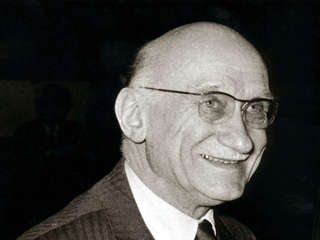
The arrest and escape of Schuman (Part III)
From Jeff Fountain’s book Deeply Rooted (Part I here, Part II here)
The advance of German forces invading France in May 1940, and sweeping around the ‘impregnable’ Maginot Line, forced waves of refugees to head westward from Lorraine. Schuman was then brought into the government led at the time by Paul Reynaud. As Undersecretary for Refugees, his task was to provide food, refuge and medical attention for his fellow Lorrainers.
After June 14, when German troops entered Paris, Reynaud resigned and the French government was forced to sign an armistice agreement with the invaders. World War One hero Marshal Pétain became the new head of state, aged 84, agreeing to give Nazi Germany the north and west of the country, including Paris, but leaving the south and east unoccupied. The administrative centre of the new government moved to the resort town of Vichy, in the central region near Clermont-Ferrand, 300 kilometres south of Paris.
It was clear to Schuman that Pétain was Hitler’s puppet, and refused to accept any role in the new regime. The old marshal quickly assumed near-absolute powers. He used these to dismantle republican ideals of ‘liberty, equality and fraternity’ in favour of ‘a social hierarchy‘. Vichy France quickly subsided into an authoritarian, pater-nalistic, anti-internationalist and reactionary Catholic state, in which opponents were regularly imprisoned.
Meanwhile, Schuman joined a small group of refugees returning to Lorraine, now occupied by the Germans. He wanted to witness first-hand the conditions there to report back to the government. More urgently, he wanted to destroy any incriminating correspondence which could compromise his German contacts.
Once in Metz, he spent the summer in energetic defense of the local population against the occupiers. As autumn arrived, Schuman’s planned to return to Paris.
These plans were abruptly ended when the Gestapo arrested him. He was the first French member of Parliament to suffer this indignity.
Seven long months in solitary confinement followed, ‘relieved’ only by sessions of harsh cross-examination. The similarity of his background and convictions to those of Adenauer had not gone unnoticed. His interrogators tried to construe that Schuman’s visit to Cologne in 1932, where Adenauer was mayor, proved the two men were in conspiratorial contact. In fact, they did not meet until after the war.
Schuman’s visit to Austria in 1938, when he had met with many prominent citizens ousted by Hitler, also was the subject of extended cross-examination.
Then a new Reichskommissar, Josef Bürknel, arrived. His reputation as a ‘brutal and efficient autocrat’ had been earned as Kommissar in Austria following the Anschluss.
Bürknel had plans for his high-profile prisoner. He transferred him to house arrest under police surveillance in Neustadt in the Rhineland, scheming to ‘turn’ Schuman with his large popular following in Lorraine to support the Nazi regime. That strategy had often worked in Austria.
The Reichskommissar probed for weaknesses and grounds for blackmail. He tried to cower his prisoner into cooperation by threatening to send him to Dachau, the feared concentration camp near Munich.
As a close associate of SS chief Heinrich Himmler, Bürknel was no doubt well-informed about the ‘Final Solution’ policy to exterminate Europe’s Jewry. In Austria, Bürknel had introduced anti-semitic measures to syphon Jewish wealth into Nazi coffers.
Some have speculated that during these interrogation sessions, Bürknel may have boasted of his absolute powers over Austria’s Jews to intimidate Schuman, divulging details of the genocide underway at the time.
Bürknel tried coaxing Schuman with offers of high office. He asked his prisoner for an article to be published in German, on any topic. The simple appearance of an article under his name would be useful Nazi propaganda giving the appearance of complicity on behalf of this leading Lorrainer of high reputation.
Schuman for his part shrewdly played the conversations to gather as much information as possible about developments in Nazi Germany. As Bürknel tried to win Schuman’s cooperation, the Gestapo leader allowed his prisoner a limited freedom of movement, under the watch of guards.
Ever the keen listener, Schuman gleaned all the information he could from local townfolk and libraries. He made clandestine contact with visiting alumni and professors of the Metz seminary and with the Lorraine and German resistance. His training in statistics at the University of Munich helped him put together a picture of German casualties on the eastern front and diminishing material resources. As early as 1942, he concluded that Allied victory was a statistical certainty. Germany had lost already 1.2 million men. At least another three or four million had been immobilised through injury or disease. Defeat was a matter of time.
Schuman knew this information, and that of the genocide being conducted against the Jews across the continent, had to reach the free world. He had to find a way to escape from his house arrest. That would be no small undertaking. Free France was hundreds of kilometres away across occupied territory. And there would be a price on his head.
Jeff Fountain
Director Schuman Centre

This Post Has 0 Comments